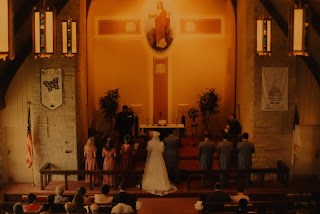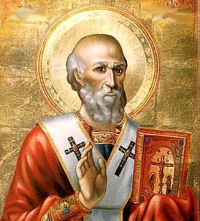MATTHEW 10:26-39
WE FAITHFULLY CONFESS
THE TRUTH FOR OUR SALVATION.
In the name + of Jesus.
Our Lord Jesus Christ said,
“Everyone who acknowledges me before men, I also will acknowledge before my Father who is in heaven, but whoever denies me before men, I also will deny before my Father who is in heaven.” (Matthew 10:32-33) Therefore, we faithfully confess the truth for our salvation.
This sounds easy enough, but Jesus also said that this confession comes with a cost: “Do not think that I have come to bring peace to the earth. I have not come to bring peace, but a sword. For I have come to set a man against his father, and a daughter against her mother, and a daughter-in-law against her mother-in-law. And a person's enemies will be those of his own household.” (Matthew 10:34-36) We might think that the sword Jesus speaks about is Islamic terrorism or an erosion of freedoms for Christians. While these are threats to pray about, Jesus does not speak here about international terrorism or civic groups who fight to get the Ten Commandments removed from a county courthouse. He spoke about animosity in one's own family and friends.
Now, it may sound strange that people would be hostile toward a message which you hold so dear, and hostile toward you who joyfully confess it. Why does Jesus and his salvation bother people so much? St. Paul gives the answer:
“The mind that is set on the flesh is hostile to God, for it does not submit to God's law; indeed, it cannot.” (Romans 8:7) People refuse to acknowledge that they are sinners. They like their sins. They aren't going to apologize for them or stop doing them. They conclude that God is the one with the problem, and they have friends who encourage them to continue in their sins. They don't want to repent; they like what they are.
People are also hostile toward God's word and those who confess it because they despise God's grace. Even people who profess to be Christians are guilty of despising God's grace. We do this because we think there are good reasons that we are saved: We behave better. We go to church more. We pray harder. We think that we have done something to prove our worth before God. In other words, we believe that we deserve our salvation because of something we have done. In that case, your salvation is not a gift, it is a wage. This is to reject God's word:
“By grace you have been saved … so that no one may boast.” (Ephesians 2:8-9)
We faithfully confess the truth for our salvation. The truth is that your salvation has been taken out of your hands. You do nothing to be saved. That is the very nature of being saved. He who is lost must be found by someone else. He who is dead must be revived by another. He who is hostile must be converted by the love of another. And this is what our Lord has done.
We faithfully confess the truth for our salvation. We confess what God has revealed. The Lord became flesh and willingly lived a humble and holy life in obedience to God and in service to his neighbor. But Jesus gives you the credit for it. He did the work, and he gives you the benefit. By faith, you are justified; by grace, you are saved. The sins you have committed—whether you have taken pride in being better than others, taken pleasure in seeing the sins of others, or taken pleasure in your own sins—these sins Jesus has taken from you. Jesus suffered your curse and was afflicted by the wrath that you deserve. The punishment has been lifted from you. You are forgiven. You are not forgiven because you are better. You are forgiven because Jesus gives you salvation which you have not worked for and a blameless record that you do not deserve. It is by grace you have been saved. Since your salvation is completely the work of Jesus Christ, you can be certain that you are saved. He did work—completely, perfectly, freely. You, by faith, benefit. We faithfully confess this, certain that there is no other Savior, and confident that Jesus' saving work is perfect.
Still, it comes at a cost. Satan enlists others to demand that we look for salvation outside of or in addition to Jesus. In the Middle Ages, people were told to look for their salvation from the Pope in Rome. The Pope urged people to buy indulgences which were suppose to deliver people from purgatory, to pray to saints, to go on pilgrimages to shrines, and to reverence the relics of holy people. God's grace was not enough; and Jesus Christ was pushed aside. Even though it seemed ultra-religious, none of it was supported by Scripture.
God graciously directed some people back to their Bibles for comfort and assurance. While this brought peace to troubled souls, it also brought a sword. The Pope excommunicated clergy who demanded their answers from the Bible rather than Church traditions, and he banned writings which pointed people to Jesus. The Emperor, Charles V, threatened the destroy churches, kingdoms, and princes who did not turn back to the established customs. Emperor Charles summoned these princes to Augsburg where he demanded their allegiance to him and to the Pope. These Lutheran princes, instead, came to the Diet of Augsburg to faithfully confess God's truth. This was not a show of stubborn independence or rebellion against authority. When the Lutheran princes at Augsburg were commanded to forfeit their confession for the sake of unity in the Church and empire, Margrave George of Brandenburg replied,
“Rather than deny my God and suffer the Word of God to be taken from me, I will kneel down and have my head struck off.” (Concordia Triglotta, page 23) The Lutheran princes faithfully confessed God's truth even though it meant a sword against them. They stood firm on God's word for their own salvation and for the salvation of those in their kingdoms.
We faithfully confess the truth for our salvation. To keep this confession pure is to keep certain of our salvation. If this confession becomes polluted, God's truth becomes distorted or even denied. Then, our salvation is at least put in doubt, at worst it is lost completely. Therefore, our devotion to God's truth is essential.
We faithfully confess the truth for our salvation, knowing that we may pay a price for holding to this confession. We may think we can avoid the sword by keeping our confession to ourselves, but silence is not an option. For this is what Jesus says,
“Everyone who acknowledges me before men, I also will acknowledge before my Father who is in heaven, but whoever denies me before men, I also will deny before my Father who is in heaven.” (Matthew 10:32-33) Jesus does not say that it is enough to acknowledge him in your heart and keep your faith a secret. If we believe in Jesus and take his word to heart, it will reveal itself in our words and actions. Light cannot be hidden. Confessions must be made with words. However, if you confess your faith and suffer for it, you are in good company. The apostles died rather than remain silent in their confession. The Lutheran princes were ready to die rather than deny Christ and his word. About twenty years after the Augsburg Confess, the sword did come to their lands because of their confession. I don't know what price you might have to pay or what cross you will have to bear. If you refuse to confess God's truth, the world may praise you; but Christ will disown you.
Yes, these are serious matters with eternal consequences. But that is why we take them seriously. And that is why we need our Lord's word and grace. He reminds us:
“Do not fear those who kill the body but cannot kill the soul. Rather fear him who can destroy both soul and body in hell.” (Matthew 10:28-29) We need not fear those who are mortal. Rather, we fear the Lord who holds our eternal judgment in his hands. But good news: The Lord who holds our eternal judgment in his hands has also told us that we are redeemed and beloved by him. Even if our body is slain, we are not robbed of life in God's kingdom. And if the Lord cares enough about the number of hairs on your head, he certainly will preserve you in his kingdom through his word and sacraments.
Therefore, we devote ourselves to God's truth—reading, learning, marking, and inwardly digesting it—so that our confession will remain true, so that our Lord will keep us faithful, and so that we will be sure of our salvation. We faithfully confess God's truth for our salvation; and our comfort and confidence is always this: that our Lord Jesus Christ is pleased to acknowledge us before the Father, and that our glory will be known in the life to come.
In the name of the Father and of the Son + and of the Holy Spirit. Amen.








